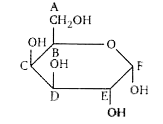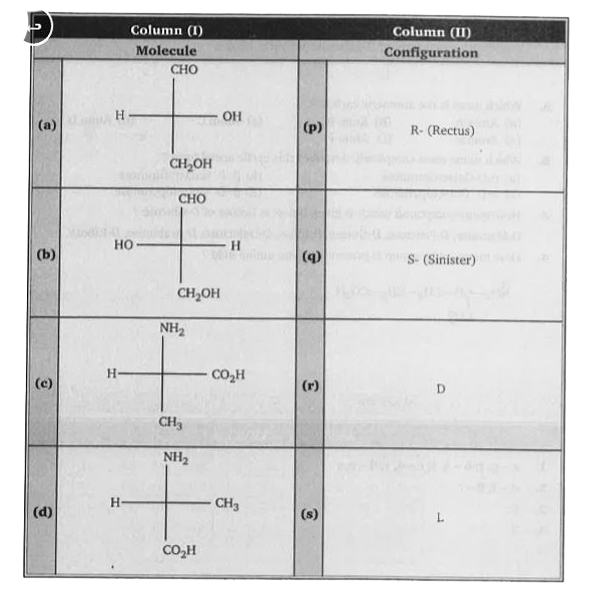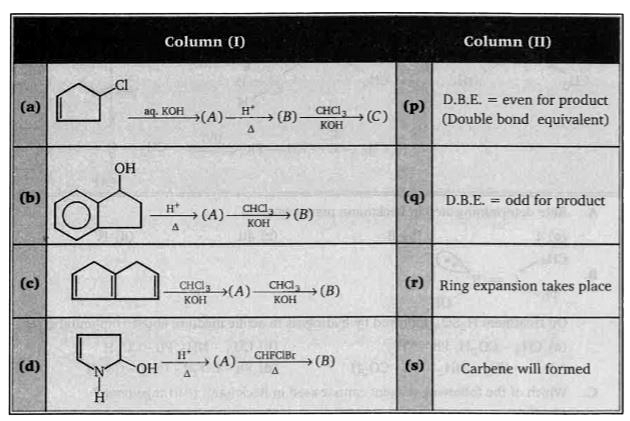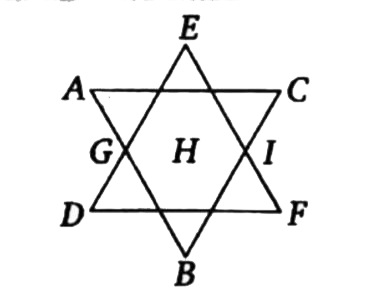
One cyclic acetal form of D - galactose is shown above.
Which atom is the anomeric carbon ?
(a) Atom A (b) Atom B (c) Atom C (d) Atom D (e) Atom E (f) Atom FSolution in Telugu
a - p,r , b - q, s, c - q,s , d - p ,r
Topper's Solved these Questions
Similar Questions
Match the colume (I) and Column (II). (Matrix)

View Solution
Double bond equivalent of D is :
View SolutionMatch the column I and II.

View SolutionExplain and differentiate between the following terms. a. Polycyclic compounds b. Fused rings c. Bicyclic compounds d. Bridgehead C atoms e. Bridge C atoms f. Bridged bicyclics
View SolutionOne cyclic acetal form of D-galactose is shown above. Which atom is the anomeric carbon ?
View SolutionWhat is the atomicity of the following ? (a) Oxygen , (b) Ozone , (c ) Neon , (d) Sulphur, (e ) Phosphorus , (f) Sodium
View SolutionAn element E exists in three allotropic forms A, B and C. In allotrope A, the atoms of element E are joined to form spherical molecules .In allotrope B,each atom of element E is surrounded by three other E atoms to form a sheet like structure . In allotrope C, each atom of element E is surrounded by four other E atoms to form a rigid structrue. (a) Name the element E (b) What is allotrope A? (c )what is allotrope B? (d) What is allotrope C? (e) Which allotrope is used in making jewellery? (f) Which allotrope is used in makeing anode of a dry cell?
View SolutionThe increasing order of the atomic radii of the following elements is : (a) C (b) O(c) F(d) ( e) Br
View SolutionFrom the data given below A, B, C and D respectively are,
(A) 10e−, atomic no. 11 (B) 10e−, atomic no. 6
(C ) 10e−, atomic no. 10 (D) 10e−, atomic no. 9
View SolutionThe increasing order of the atomic radii of the following elements is: a) "C," b) "O," c) "F" d) " Cl " e)" Br "
View Solution
There are nine elements A to I. these are belongs to p-block element other than halogen. If atomic number of B is average of atomic number of A and C and atomic number of E is average of atomic number of D and F and atomic number of H is average of atomic number of G and I. atomic numbers of B, E and H are 7,15 and 83 respectively and atomic numbers of C, I and F are greater than A, G and D respectively.
Q. The incorrect order is:
View SolutionThere are nine elements A to I. these are belongs to p-block element other than halogen. If atomic number of B is average of atomic number of A and C and atomic number of E is average of atomic number of D and F and atomic number of H is average of atomic number of G and I. atomic numbers of B, E and H are 7,15 and 83 respectively and atomic numbers of C, I and F are greater than A, G and D respectively. Q. The correct statement is:
View SolutionThere are nine elements A to I. these are belongs to p-block element other than halogen. If atomic number of B is average of atomic number of A and C and atomic number of E is average of atomic number of D and F and atomic number of H is average of atomic number of G and I. atomic numbers of B, E and H are 7,15 and 83 respectively and atomic numbers of C, I and F are greater than A, G and D respectively. Q. Which of the following statement is incorrect?
View SolutionSymbolically represent the following atoms using atomic number and mass number .
(a) Carbon (b) Oxygen ( c) Silicon (d) Beryllium
View SolutionThe increasing order of the atomic radii of the following elements is :
(a) C (b) O(c) F(d) ( e) Br
View SolutionExplain and differentiate between the following terms. a. Polycyclic compounds b. Fused rings c. Bicyclic compounds d. Bridgehead C atoms e. Bridge C atoms f. Bridged bicyclics
View Solution
